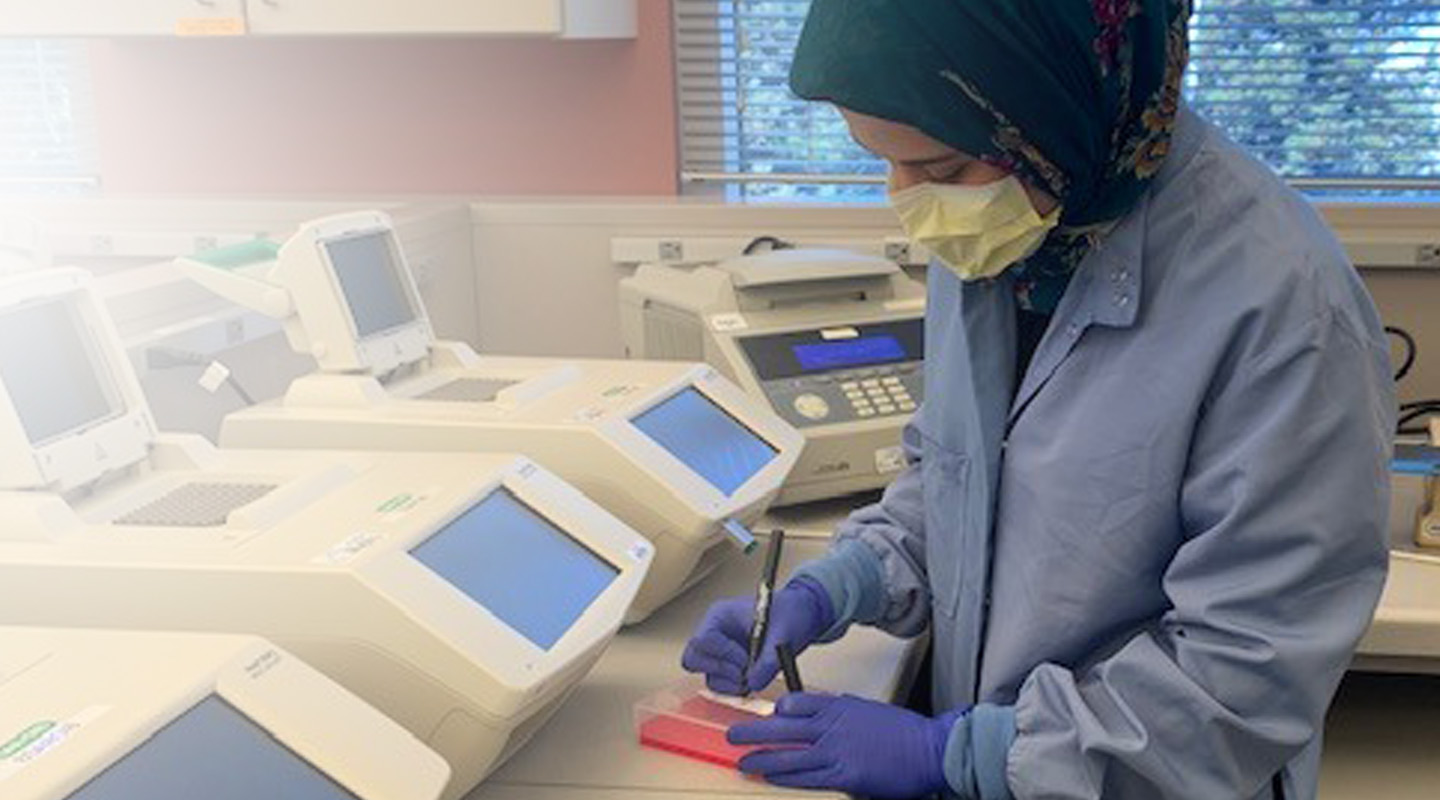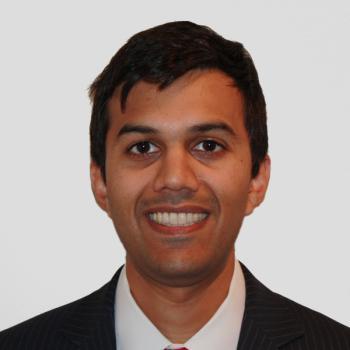Molecular Genetic Pathology
A Subspecialty Of Molecular Pathology & Genomics

About Molecular Genetic Pathology
Many genetic diseases and types of cancer result from the mutation of a single gene or a specific chromosomal rearrangement. Understanding which genes have changed allows clinicians to treat these specific genetic diseases or in the case of cancerous tumors, to provide therapies and treatments that directly target these changes. Stanford’s Molecular Genetic Pathology lab specializes in identifying these changes, setting the cornerstone of the patient’s treatment plan.
Testing
Submit a Sample
Our Faculty
Stanford’s Molecular Genetic Pathology Laboratory provides a full range of diagnostic services for inherited genetic disorders, hematolymphoid malignancies, solid tumors, and genetic risk factors via analysis of the nucleic acids (DNA and/or RNA).
Our test offerings include: diagnostic assays and carrier screening assays for inherited genetic disorders, as well as prenatal diagnostics. In addition, the laboratory performs assays for thrombophilia risk factors, solid tumors, and for acquired hematolymphoid disorders such as leukemias and lymphomas.
Inherited Genetic Diseases and Prenatal Diagnostics
Stanford’s Molecular Pathology Lab offers a full range of diagnosis for inherited diseases, including Cystic Fibrosis, the most common life threatening autosomal recessive disorder in Caucasians. Our screening detects 39 CFTR mutations, including the 23 mutations currently recommended by the American Board of Medical Genetics (ABMG) and the American College of Obstetricians and Gynecologists (ACOG).
We also offer testing for Fragile X for mutations causing mental retardation, Connexin 26 and 30 for mutations causing hearing loss and deafness.
Next Generation Sequencing
Stanford’s Next Generation Sequencing assays provide molecular analysis of solid tumor and hematologic malignancies, including mutation profiling for targeted therapies. Our lab developed testing focuses on identifying DNA mutations known to contain clinically significant somatic mutations. This focus provides actionable information that can be immediately utilized for diagnosis, prognostic assessment, patient risk stratification and eligibility for clinical trials. Our assays include:
Solid Tumors (STAMP)
Stanford’s Solid Tumor Actionable Mutation Panel (STAMP) targets over 197 genes that have been specifically selected for their known impact as actionable targets of existing or emerging anti-cancer therapies, their prognostic features, or for their mutation recurrence frequency in patients with known cancer types. The sequencing and analysis is performed in-house, and every case is reviewed by our pathologists who deliver a personalized interpretation based on each unique sample.
Covered Genes and Actionable Mutations
Hematopoietic and Lymphoid Neoplasms (HemeSTAMP)
The HemeSTAMP assay detects single nucleotide variants (SNVs), short insertions and deletions, and selected gene fusions in over 203 genes recurrently altered in myeloid and lymphoid neoplasms.
Gene Fusion Events (FusionSTAMP)
The Stanford Tumor Actionable Mutation Panel for Fusions (Fusion-STAMP) detects potentially clinically actionable gene fusion events implicated in cancer. This panel fully targets the transcript isoforms of over 137 genes, selected based on their known impact as actionable targets of existing and emerging anti-cancer therapies, their prognostic features, and/or their utility as diagnostic cancer biomarkers.
B Cell and T Cell Clonality
Stanford offers next generation sequencing-based characterization of gene rearrangements in B-Cells and T-Cells that aid in diagnosing leukemias and lymphomas.
T-cell receptor (TCR) genes and Immunoglobulin (Ig) genes both undergo somatic gene rearrangement resulting in a diversity of antigen binding capability among T-cell and B-cells. These gene rearrangements occur early in ontogeny and are unique to each T-cell or B-cell. These rearrangements can therefore be used as a marker of a common origin, or clonality, among a T-cell population and can be useful in the evaluation of hematopoietic disorders.
While the demonstration of a clonal T/B cell population is not necessarily reflective of a truly pathologic process, positive results interpreted in the context of all laboratory findings can support diagnosis of malignancy.
Although standardized PCR/Capillary electrophoresis (CE) based assays are commonly used in clonality testing, next generation sequencing offers additional benefits. With NGS, the exact DNA sequence specific for each clonal gene rearrangement can be identified, offering a unique opportunity to track identified clones in subsequent samples. Clonal populations that may differ in sequence but are the same size can also be readily differentiated with NGS and the quantitative nature of NGS allows for better interpretation or results.
Targeted Solid Tumor Assays
We offer a wide range of discrete testing to inform therapeutic treatment. These rapid testing offerings performed via a single base primer extension test (SnapShot methodology) include POLE mutation, KRAS, EGFR, NRAS, IDH and IDH2. KIT and BRAF hotspot mutations are also available by target-specific PCR testing.
Molecular Hematopathology Services
We offer a range of molecular hematopathology services including testing for coagulation disorders, next generation sequencing for leukemias and lymphomas, and testing for individual markers including Calreticulin and MGMT.
Test Directory
Learn more about our Molecular Genetic Pathology testing.
Sample Submission
All specimens must be accompanied by a Stanford requisition and all samples must be labeled with the patient’s name, and at least one other unique identifier.
Proper specimen collection is vital to ensuring an accurate test result. A fasting specimen is preferred or required for many laboratory tests to reduce possible test interference. Please refer to the individual test listing in the Test Directory for fasting requirements collection requirements.
Shipping
Samples should be shipped or delivered via courier to:
Stanford Clinical Laboratories
Attn: Specimen Processing
3375 Hillview Avenue
Palo Alto, CA 94304
Customer Service Phone: 1-877-717-3733
New Client Inquiries
To arrange to be set up as a new client, please contact:
ClinOpsContracts@stanfordhealthcare.org.
Contact Us
To submit a sample to Molecular Genetic Pathology, please complete a requisition and send with sample to:
Stanford Clinical Laboratories
Attn: Specimen Processing
3375 Hillview Avenue
Palo Alto, CA 94304
Customer Service Phone:
1-877-717-3733
molecularpathology@
stanfordhealthcare.org
Do not send patient info to this email.
Medical Director:
James L. Zehnder, MD
To arrange to be set up as a new client, please contact:
ClinOpsContracts@
stanfordhealthcare.org
SAMPLE SUBMISSION LOGISTICS
For more information on submitting cases, see the links below:
All Requisitions
Download Stanford Requisitions for specimen submission.
Account Set-up
Information on personalized requisitions, supplies, shipping and courier pick-up.
Pricing Inquiries
Pricing inquiries and contract information.
Billing
Billing policies, information and questions.
Results Web Portal
Request access or log-in to our client results portal.
Specimen Collection and Handling
Specifications for Specimen Collection and Handling.
Consult Service FAQ's
Get answers to Frequently Asked Questions.
James L. Zehnder, MD

APPOINTMENTS
- Professor of Pathology and Medicine (Hematology)
- Director of Clinical Pathology
- Director, Molecular Pathology Laboratory
- Director, Coagulation Laboratory
PRACTICE AREAS
- Cancer > Hematology
- Hematology
- Pathology
- Pathology and Laboratory Medicine
CONTACT
Email: zehnder@stanford.edu
Phone: (650) 723-9232
More information about James Zehnder:
https://med.stanford.edu/profiles/james-zehnder
https://profiles.stanford.edu/james-zehnder
Christian Kunder, MD, PhD

APPOINTMENTS
- Clinical Assistant Professor of Pathology (Surgical Pathology and Molecular Genetics Pathology)
- Associate Director of Molecular Genetic Pathology Laboratory
PRACTICE AREAS
- Anatomic Pathology
- Surgical Pathology
- Urological Pathology
- Soft Tissue Pathology
- Molecular Pathology
CONTACT
Phone: (650) 721-8536
More information about Christian Kunder:
https://med.stanford.edu/profiles/christian-kunder
https://profiles.stanford.edu/christian-kunder
Carlos Suarez, MD

APPOINTMENTS
- Clinical Assistant Professor of Pathology (Genomics and Molecular Genetic Pathology)
- Co-Director, Genetic Testing Consult Service at Stanford Healthcare
- Associate Director, Molecular Genetic Pathology Laboratory
PRACTICE AREAS
- Anatomic Pathology
- Clinical Pathology
- Molecular Genetic Pathology
CONTACT
Email: cjsuarez@stanford.edu
More information about Carlos Suarez:
https://med.stanford.edu/profiles/carlos-jose-suarez
https://profiles.stanford.edu/carlos-jose-suarez
Helio Costa

APPOINTMENTS
- Instructor, Pathology
PRACTICE AREAS
- Molecular Oncology
- Molecular Pathology
- Medical Genetics
- Clinical Pathology
CONTACT
Email: hcosta@stanford.edu
More information about Helio Costa:
https://med.stanford.edu/profiles/helio-costa
Wei Gu

APPOINTMENTS
PRACTICE AREAS
- Molecular Genetic Pathologyy
CONTACT
Rohan Joshi

APPOINTMENTS
- Instructor, Pathology
PRACTICE AREAS
- Molecular Genetic Pathology
- Clinical Pathology
CONTACT
Phone: (650) 498-4987
More information about Rohan Joshi:
https://med.stanford.edu/profiles/243972
Li Lei, MD, PhD

APPOINTMENTS
- Clinical Instructor of Pathology
PRACTICE AREAS
- Surgical Pathology
- Molecular Genetic Pathology
CONTACT
Email: lilei@stanford.edu
More information about Li Lei:
https://med.stanford.edu/profiles/li-lei
https://profiles.stanford.edu/li-lei
Amy Lo

APPOINTMENTS
- Adjunct Clinical Assistant Professor, Pathology
PRACTICE AREAS
- Molecular Genetic Pathologyy
CONTACT
Email: amyalo@stanford.edu
More information about Amy Lo:
https://med.stanford.edu/profiles/amy-lo
Bing Melody Zhang, MD

APPOINTMENTS
- Clinical Assistant Professor of Pathology
- Assistant Director, Histocompatibility and Immunogenetics Laboratory
PRACTICE AREAS
- Clinical Pathology
- Molecular Genetic Pathology
- Histocompatibility
- Immunogenetics
CONTACT
Email: mbzhang@stanford.edu
More information about Bing Melody Zhang:
https://med.stanford.edu/profiles/Bing%20Zhang
https://stanfordbloodcenter.org/leadership/bing-melody-zhang/
Henning Stehr

APPOINTMENTS
- Clinical Assistant Professor of Pathology
PRACTICE AREAS
- Molecular Genetic Pathology
CONTACT
Email: stehr@stanford.edu
More information about Henning Stehr:
https://profiles.stanford.edu/stehr
Stanford’s Molecular Genetic Pathology Laboratory provides a full range of diagnostic services for inherited genetic disorders, hematolymphoid malignancies, solid tumors, and genetic risk factors via analysis of the nucleic acids (DNA and/or RNA).
Our test offerings include: diagnostic assays and carrier screening assays for inherited genetic disorders, as well as prenatal diagnostics. In addition, the laboratory performs assays for thrombophilia risk factors, solid tumors, and for acquired hematolymphoid disorders such as leukemias and lymphomas.
Inherited Genetic Diseases and Prenatal Diagnostics
Stanford’s Molecular Pathology Lab offers a full range of diagnosis for inherited diseases, including Cystic Fibrosis, the most common life threatening autosomal recessive disorder in Caucasians. Our screening detects 39 CFTR mutations, including the 23 mutations currently recommended by the American Board of Medical Genetics (ABMG) and the American College of Obstetricians and Gynecologists (ACOG).
We also offer testing for Fragile X for mutations causing mental retardation, Connexin 26 and 30 for mutations causing hearing loss and deafness.
Next Generation Sequencing
Stanford’s Next Generation Sequencing assays provide molecular analysis of solid tumor and hematologic malignancies, including mutation profiling for targeted therapies. Our lab developed testing focuses on identifying DNA mutations known to contain clinically significant somatic mutations. This focus provides actionable information that can be immediately utilized for diagnosis, prognostic assessment, patient risk stratification and eligibility for clinical trials. Our assays include:
Solid Tumors (STAMP)
Stanford’s Solid Tumor Actionable Mutation Panel (STAMP) targets over 197 genes that have been specifically selected for their known impact as actionable targets of existing or emerging anti-cancer therapies, their prognostic features, or for their mutation recurrence frequency in patients with known cancer types. The sequencing and analysis is performed in-house, and every case is reviewed by our pathologists who deliver a personalized interpretation based on each unique sample.
Covered Genes and Actionable Mutations
Hematopoietic and Lymphoid Neoplasms (HemeSTAMP)
The HemeSTAMP assay detects single nucleotide variants (SNVs), short insertions and deletions, and selected gene fusions in over 203 genes recurrently altered in myeloid and lymphoid neoplasms.
Gene Fusion Events (FusionSTAMP)
The Stanford Tumor Actionable Mutation Panel for Fusions (Fusion-STAMP) detects potentially clinically actionable gene fusion events implicated in cancer. This panel fully targets the transcript isoforms of over 137 genes, selected based on their known impact as actionable targets of existing and emerging anti-cancer therapies, their prognostic features, and/or their utility as diagnostic cancer biomarkers.
B Cell and T Cell Clonality
Stanford offers next generation sequencing-based characterization of gene rearrangements in B-Cells and T-Cells that aid in diagnosing leukemias and lymphomas.
T-cell receptor (TCR) genes and Immunoglobulin (Ig) genes both undergo somatic gene rearrangement resulting in a diversity of antigen binding capability among T-cell and B-cells. These gene rearrangements occur early in ontogeny and are unique to each T-cell or B-cell. These rearrangements can therefore be used as a marker of a common origin, or clonality, among a T-cell population and can be useful in the evaluation of hematopoietic disorders.
While the demonstration of a clonal T/B cell population is not necessarily reflective of a truly pathologic process, positive results interpreted in the context of all laboratory findings can support diagnosis of malignancy.
Although standardized PCR/Capillary electrophoresis (CE) based assays are commonly used in clonality testing, next generation sequencing offers additional benefits. With NGS, the exact DNA sequence specific for each clonal gene rearrangement can be identified, offering a unique opportunity to track identified clones in subsequent samples. Clonal populations that may differ in sequence but are the same size can also be readily differentiated with NGS and the quantitative nature of NGS allows for better interpretation or results.
Targeted Solid Tumor Assays
We offer a wide range of discrete testing to inform therapeutic treatment. These rapid testing offerings performed via a single base primer extension test (SnapShot methodology) include POLE mutation, KRAS, EGFR, NRAS, IDH and IDH2. KIT and BRAF hotspot mutations are also available by target-specific PCR testing.
Molecular Hematopathology Services
We offer a range of molecular hematopathology services including testing for coagulation disorders, next generation sequencing for leukemias and lymphomas, and testing for individual markers including Calreticulin and MGMT.
Test Directory
Learn more about our Molecular Genetic Pathology testing.
close Testing
Sample Submission
All specimens must be accompanied by a Stanford requisition and all samples must be labeled with the patient’s name, and at least one other unique identifier.
Proper specimen collection is vital to ensuring an accurate test result. A fasting specimen is preferred or required for many laboratory tests to reduce possible test interference. Please refer to the individual test listing in the Test Directory for fasting requirements collection requirements.
Shipping
Samples should be shipped or delivered via courier to:
Stanford Clinical Laboratories
Attn: Specimen Processing
3375 Hillview Avenue
Palo Alto, CA 94304
Customer Service Phone: 1-877-717-3733
New Client Inquiries
To arrange to be set up as a new client, please contact:
ClinOpsContracts@stanfordhealthcare.org.
Contact Us
To submit a sample to Molecular Genetic Pathology, please complete a requisition and send with sample to:
Stanford Clinical Laboratories
Attn: Specimen Processing
3375 Hillview Avenue
Palo Alto, CA 94304
Customer Service Phone:
1-877-717-3733
molecularpathology@
stanfordhealthcare.org
Do not send patient info to this email.
Medical Director:
James L. Zehnder, MD
To arrange to be set up as a new client, please contact:
ClinOpsContracts@
stanfordhealthcare.org
SAMPLE SUBMISSION LOGISTICS
For more information on submitting cases, see the links below:
All Requisitions
Download Stanford Requisitions for specimen submission.
Account Set-up
Information on personalized requisitions, supplies, shipping and courier pick-up.
Pricing Inquiries
Pricing inquiries and contract information.
Billing
Billing policies, information and questions.
Results Web Portal
Request access or log-in to our client results portal.
Specimen Collection and Handling
Specifications for Specimen Collection and Handling.
Consult Service FAQ's
Get answers to Frequently Asked Questions.
close Submit a Sample
James L. Zehnder, MD

APPOINTMENTS
- Professor of Pathology and Medicine (Hematology)
- Director of Clinical Pathology
- Director, Molecular Pathology Laboratory
- Director, Coagulation Laboratory
PRACTICE AREAS
- Cancer > Hematology
- Hematology
- Pathology
- Pathology and Laboratory Medicine
CONTACT
Email: zehnder@stanford.edu
Phone: (650) 723-9232
More information about James Zehnder:
https://med.stanford.edu/profiles/james-zehnder
https://profiles.stanford.edu/james-zehnder
Christian Kunder, MD, PhD

APPOINTMENTS
- Clinical Assistant Professor of Pathology (Surgical Pathology and Molecular Genetics Pathology)
- Associate Director of Molecular Genetic Pathology Laboratory
PRACTICE AREAS
- Anatomic Pathology
- Surgical Pathology
- Urological Pathology
- Soft Tissue Pathology
- Molecular Pathology
CONTACT
Phone: (650) 721-8536
More information about Christian Kunder:
https://med.stanford.edu/profiles/christian-kunder
https://profiles.stanford.edu/christian-kunder
Carlos Suarez, MD

APPOINTMENTS
- Clinical Assistant Professor of Pathology (Genomics and Molecular Genetic Pathology)
- Co-Director, Genetic Testing Consult Service at Stanford Healthcare
- Associate Director, Molecular Genetic Pathology Laboratory
PRACTICE AREAS
- Anatomic Pathology
- Clinical Pathology
- Molecular Genetic Pathology
CONTACT
Email: cjsuarez@stanford.edu
More information about Carlos Suarez:
https://med.stanford.edu/profiles/carlos-jose-suarez
https://profiles.stanford.edu/carlos-jose-suarez
Helio Costa

APPOINTMENTS
- Instructor, Pathology
PRACTICE AREAS
- Molecular Oncology
- Molecular Pathology
- Medical Genetics
- Clinical Pathology
CONTACT
Email: hcosta@stanford.edu
More information about Helio Costa:
https://med.stanford.edu/profiles/helio-costa
Wei Gu

APPOINTMENTS
PRACTICE AREAS
- Molecular Genetic Pathologyy
CONTACT
Rohan Joshi

APPOINTMENTS
- Instructor, Pathology
PRACTICE AREAS
- Molecular Genetic Pathology
- Clinical Pathology
CONTACT
Phone: (650) 498-4987
More information about Rohan Joshi:
https://med.stanford.edu/profiles/243972
Li Lei, MD, PhD

APPOINTMENTS
- Clinical Instructor of Pathology
PRACTICE AREAS
- Surgical Pathology
- Molecular Genetic Pathology
CONTACT
Email: lilei@stanford.edu
More information about Li Lei:
https://med.stanford.edu/profiles/li-lei
https://profiles.stanford.edu/li-lei
Amy Lo

APPOINTMENTS
- Adjunct Clinical Assistant Professor, Pathology
PRACTICE AREAS
- Molecular Genetic Pathologyy
CONTACT
Email: amyalo@stanford.edu
More information about Amy Lo:
https://med.stanford.edu/profiles/amy-lo
Bing Melody Zhang, MD

APPOINTMENTS
- Clinical Assistant Professor of Pathology
- Assistant Director, Histocompatibility and Immunogenetics Laboratory
PRACTICE AREAS
- Clinical Pathology
- Molecular Genetic Pathology
- Histocompatibility
- Immunogenetics
CONTACT
Email: mbzhang@stanford.edu
More information about Bing Melody Zhang:
https://med.stanford.edu/profiles/Bing%20Zhang
https://stanfordbloodcenter.org/leadership/bing-melody-zhang/
Henning Stehr

APPOINTMENTS
- Clinical Assistant Professor of Pathology
PRACTICE AREAS
- Molecular Genetic Pathology
CONTACT
Email: stehr@stanford.edu
More information about Henning Stehr:
https://profiles.stanford.edu/stehr
close Our Faculty
California Newborn Screening Program
In addition to providing testing for patients and external clients, Stanford’s Molecular Genetic Pathology Laboratory is the exclusive diagnostic provider for the California Newborn Screening Program for the follow-up testing of cystic fibrosis and biotinidase deficiency.
Residencies and Fellowships
Clinical Pathology Residency Programs »
Stanford Pathology offers Clinical Pathology residencies as well as a combination Anatomic Pathology/Clinical Pathology Residency.
